Pret a Manger this week revealed its plans to roll out a meal deal in the UK in the final three months of this year.
The announcement marks the chain’s latest strategy to ‘double down’ on delivering strong value in a bid to win over customers following an arguably tumultuous past few years for the company.
Opening its first store in London in 1986, it quickly became the go-to spot for office workers in the city, thanks to its combination of quick service, fresh sandwiches, and organic coffees, which helped revolutionize the traditional lunch break.
In the years that followed, it enjoyed skyrocketing popularity, serving, at its peak, 1.4 million coffees a day in the UK alone, building 450 stores, and expanding its empire across the world.
However, customer loyalty may have come under threat in recent times, including after the tragic death of a teenage girl in 2016 who suffered a severe allergic reaction to sesame seeds in a mislabeled Pret baguette.
The lunchtime chain later delivered a blow to vegetarians after it shut all of its vegetarian-only stores and converted them into normal outlets after a slump in demand for meat-free sandwiches.
Changes continued earlier this year when Pret revealed it was scrapping its popular loyalty scheme that allowed customers free coffees up to five times a day and a 20 percent discount on food.
Now, no doubt in a bid to keep fans happy, the brand will roll out a meal deal format from next week, which will include deals for customers to buy a croissant and a drink, as well as a deal for a sandwich, drink, and crisps.
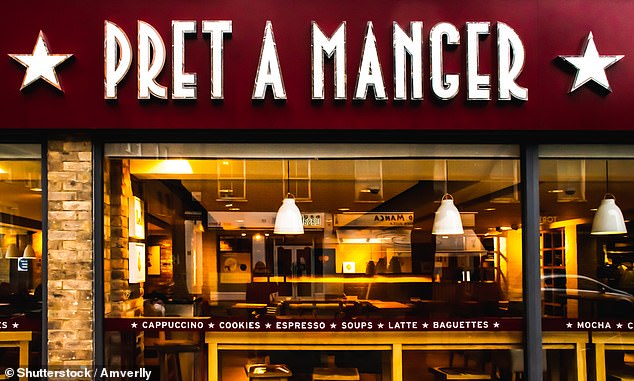
Pret a Manger is attempting to keep customers happy by launching a new meal deal from next week (stock image)
The company’s darkest moment came in 2016 when teenager Natasha Ednan-Laperouse died after suffering a severe allergic nut reaction to sesame seeds contained in a Pret baguette.
She was travelling home with her father and her friend from a dream trip to Nice on July 17, 2016.
She had an artichoke, olive and tapenade baguette just before boarding the British Airways flight but within an hour she had lost consciousness and went into cardiac arrest.
The high-street chain had failed to label its packaging and disclose that the sandwich contained sesame seeds – a fatal ingredient for Natasha.
The coroner at the inquest into her death criticised Pret’s ‘inadequate’ food labelling and said the business had not taken the issue of food allergies seriously enough.
Natasha’s Law was passed in the fallout of the tragedy, which has forced all food retailers to clearly label all foods packed and produced on their premises with a complete list of ingredients.
Before the law came into place, there was a gap in legislation which meant producers did not have to put ingredient or allergen labels on food that was made on-site.
Following her death, Pret released the following statement, ‘We are deeply sorry for the loss of Natasha Ednan-Laperouse, who died after eating a Pret baguette containing sesame. I said we would learn from this tragedy and ensure meaningful changes result from it.’
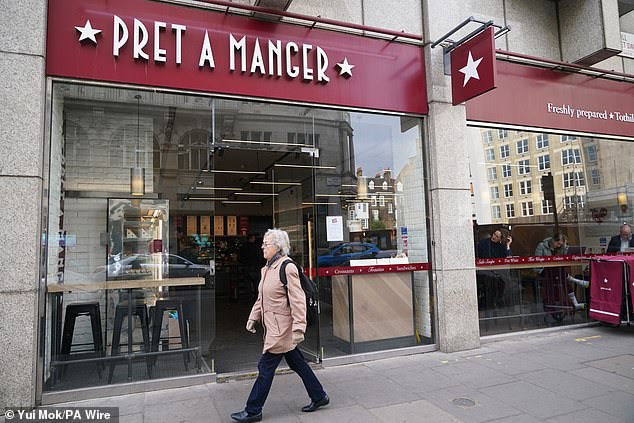
Since opening its first store in 1986, Pret has enjoyed skyrocketing popularity, serving at its peak 1.4million coffees and day in the UK alone (stock image)

The chain made a shock announcement that it would scrap its ‘too good to be true’ Club Pret subscription scheme (stock image)

The wildly popular membership used to give customers five barista-made drinks a day for £30 a month – but it has now been scrapped
The brand outlined the allergen label changes that it planned to roll out before concluding, ‘I hope this sets us on course to drive change in the industry and ensure customers with allergies are as protected and informed as possible. Nothing is more important to Pret right now.’
Pret was later forced to close all of its vegetarian-only stores and convert them into normal outlets due to a slump in demand for meat-free sandwiches.
The move marked an end to the concept that was introduced nine years ago as veganism’s popularity continues to wane.
At its peak, there were 10 Veggie Prets across the UK and, in 2019, the High Street brand had been planning to convert more until the pandemic grounded their ambitions.
But perhaps Pret’s biggest challenge came in 2020 when Covid struck – killing off dozens of businesses that relied on workers on their daily commute.
A wave of lockdowns saw the closure of offices, and in turn, a steep drop in Pret’s regular footfall – putting a hole in its finances.
In 2020, the chain warned of ‘material uncertainties’ as sales plummeted causing them to permanently closed 74 outlets in the UK and 22 in the US.
Pret’s chief executive said the impact of social distancing had been ‘severe’ and has changed consumer habits.
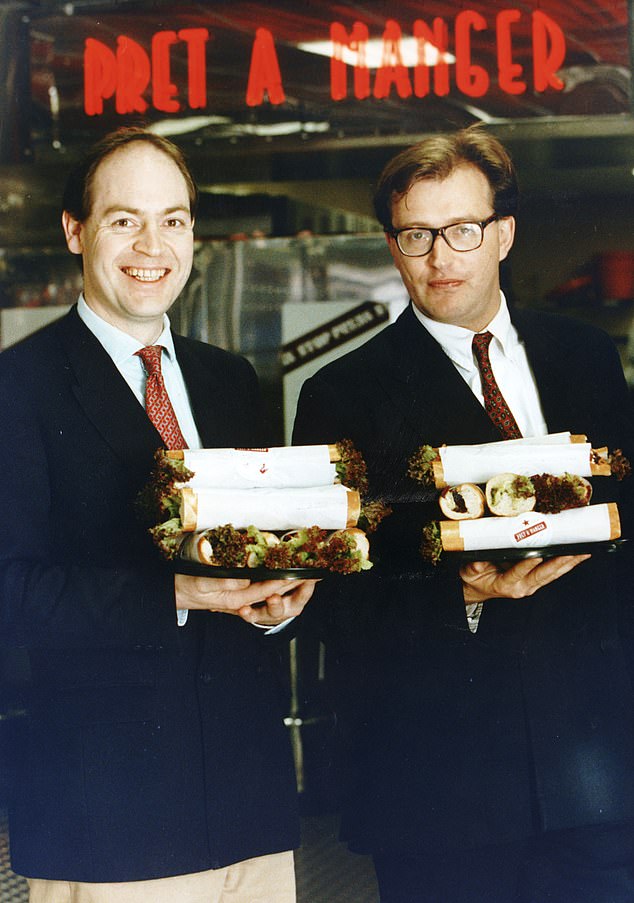
Since it was founded in the 1980s, co-founders Julian Metcalfe, an old Harrovian, and his university friend Sinclair Beecham, have spent decades building up the brand and its reputation
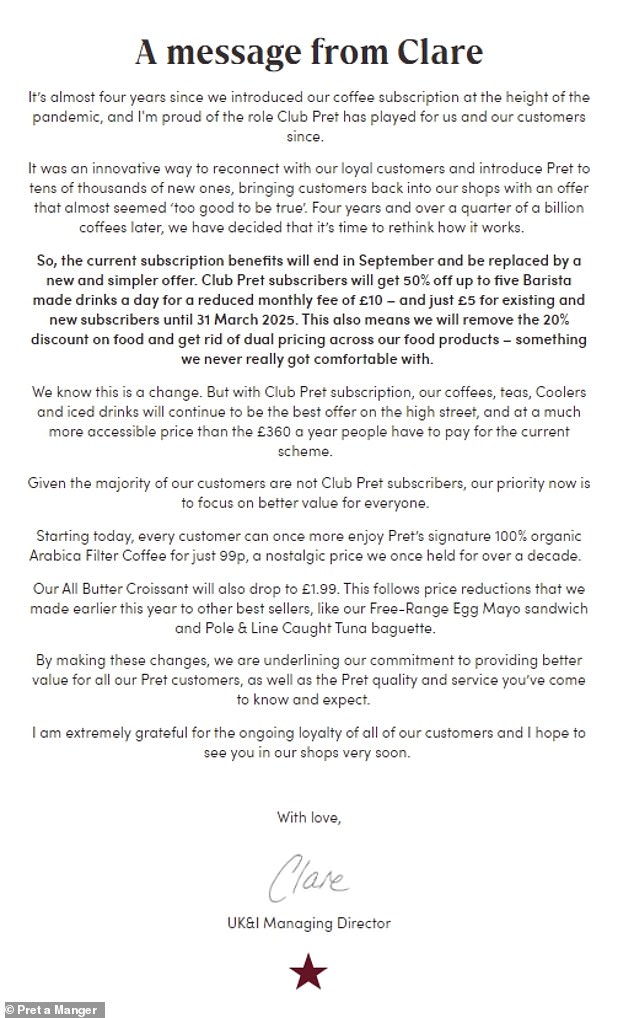
Pret’s UK managing director Clare Clough message to subscribers about the changes to its subscription model
The British sandwich market is worth £7 billion a year, still smaller than its pre-pandemic levels of £8bn. Many workers are continuing to work from home on Mondays and Fridays in particular.
Then came the wildly popular membership that gave customers five barista-made drinks a day for £30 a month.
The coffee chain broke the news in an email to Club Pret subscribers in which they told customers it was ‘time to rethink how it works’, with the current deal having been running for the previous four years.
Launched at the height of the pandemic in September 2020, it was aimed at enticing customers working from their homes back out and into the store.
But the scheme proved more popular than bosses had ever imagined, piling strain on the firm’s workers. Initially, Pret’s chief executive, Pano Christou, expected 2-3,000 people to sign up on the first day, but by 3pm that day the figure was already 16,500.
By April 2023, according to the company’s own figures, the subscription scheme was being used a staggering 1.25million times per week.
Business chiefs claimed the scheme was so popular it was actually denting business – with some claiming it echoed the Hoover free flights fiasco three decades earlier, when the vacuum cleaning firm offered trips to America worth £600 for every purchase over £100.
On this occasion, the company had to row back on the offer when customer engagement far outstripped expectations.

The company’s darkest moment came in 2016 when teenager Natasha Ednan-Laperouse (pictured) died after suffering a severe allergic nut reaction to sesame seeds contained in a Pret baguette

Natasha had an artichoke, olive and tapenade baguette (pictured on the flight, moments before she died) just before boarding the British Airways flight but within an hour she had lost consciousness and went into cardiac arrest
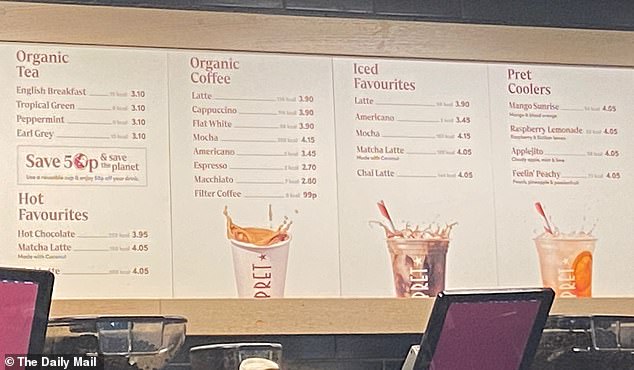
The price for drinks listed at the Pret store at High Street Kensington station, West London, last year
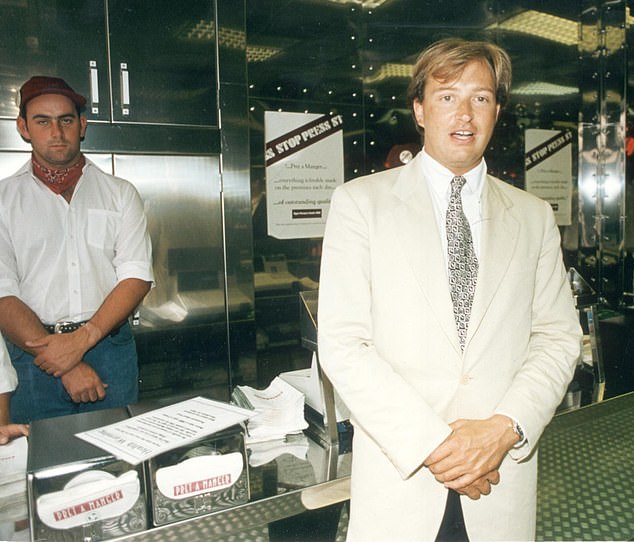
Pictured: Julian Metcalfe, who set up the Pret a Manger shops in the 1980s

Julian Metcalfe pictured at The Connaught in London in October 2013. He sold his shares in Pret in 2018
For Pret, a similar struggle was on the cards. With coffees costing upwards of £3 per drink, its Club Pret initiative meant customers could guzzle their way through £450 worth of drinks for just £30 a month.
In reality, it is unlikely anyone claimed the full offer. However, the more industry subscribers could potentially offer out their leftover drinks to friends and family who aren’t paying to be part of the ‘club’.
And that is precisely what happened, prompting Pret to clampdown on it and demand customers log in to its own app every day if they wanted to claim their allocated drinks – no longer allowing screenshots of the codes to be used.
However, the app update caused some customers to mysteriously lose their loyalty bonuses sometimes when they logged in – inspiring a wave of complaints.
The huge demand created by the app reportedly forced Pret’s staff to go into overdrive in a desperate bid to keep up with customers.
There were even stories of some staff members switching off the iced coffee machines and telling customers they were broken because they didn’t have time to make them all.
One former Pret employee claimed it put workers under ‘unbelievable pressure’.
‘They suddenly threw thousands of extra people at the staff without the right equipment to cope with the demand,’ the worker said, reported the Telegraph.
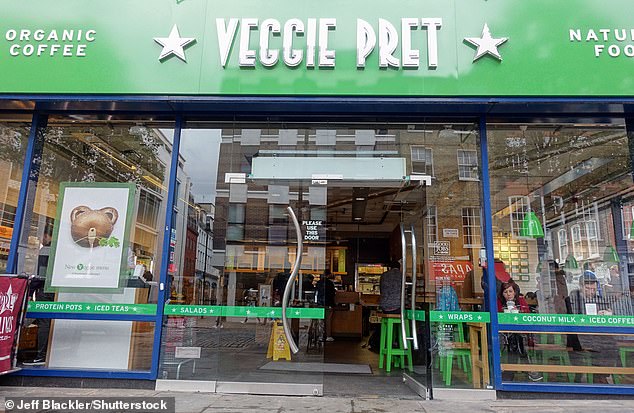
Pret was also forced to close all of its vegetarian-only stores and convert them into normal outlets due to a slump in demand for meat-free sandwiches. Pictured: The Veggie Pret store on Broadwick Street in Soho, London, in 2017

The remaining Veggie Pret stores are all now selling meat products like this Chicken and Butternut Risotto Soup
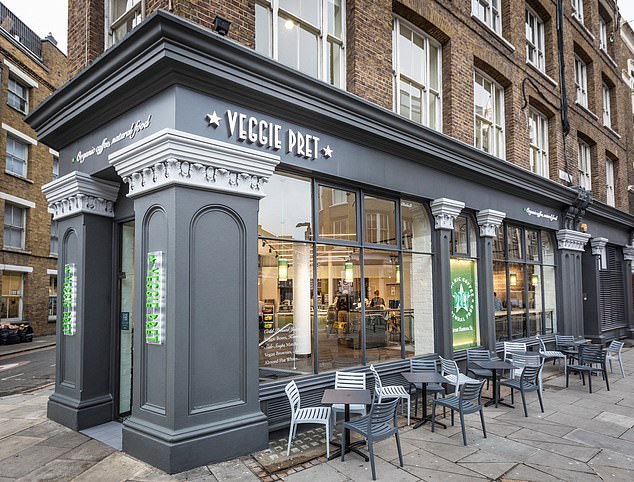
The Veggie Pret on Great Eastern Street in London’s Soho was reopened as a standard Pret a Manager
‘It has been heartbreaking for the staff and for the customers because trust and loyalty between them were always very important. Now the staff are having to deal with a good many people feeling upset.’
But Pret is not the only cafe-style store to struggle to make a subscription service work. Krispy Kreme, which is owned by the same parent company, has just scrapped its own Sip & Save subscription scheme, launched in May 2021.
The director of the British Sandwich & Food to Go Association Jim Winship said he does not expect other companies to follow Pret’s example of a subscription scheme.
But Pret faced opposition as soon as it was founded in the 1980s from a failed independent shop in Hampstead. It was three years before the co-founders managed to open its second outlet.
Since then co-founders Julian Metcalfe, an old Harrovian, and his university friend Sinclair Beecham, have spent decades building up the brand and its reputation.
The pair wanted staff to be chosen for their cheery disposition rather than experience, and allowed employees to give away coffees at random to customers they felt deserved it.
Customers also felt they were part of a social movement because unsold food was given away to homeless people and food banks – something that is still done today.
Metcalfe sold his stake in Pret in 2018, and the company is now 90 per cent owned by JAB, the Luxembourg-based investment vehicle of the Reimann family of Germany.
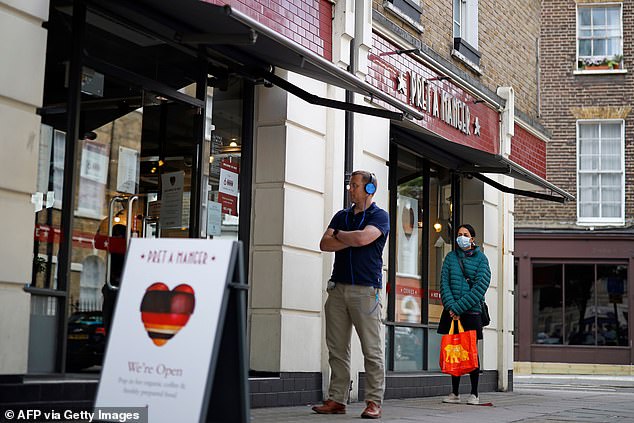
Pret’s chief executive said the impact of social distancing had been ‘severe’ and has changed consumer habits. Pictured: Customers adhere to social distancing as they queue to enter a recently re-opened Pret-A-Manger
He recently told The Telegraph the company has ‘let down’ the customers he worked so hard to attract.
But Pret remains positive about its future and has claimed the business is in good health and has recovered well since the pandemic.
In July last year Pret, returned to profitability for the first time since 2018, with revenue reaching £790m.
In the first half of 2023 sales reached £429m, up 20 per cent from 2022.
In September last year, Pret reported that sales rose by 10 per cent in the first half of 2024.
And since 2021, the company has opened in seven new markets (now operating in 18), beating its target of five new entries by end-2023.
This year, Pret is expected to open just under 150 locations globally, and it will be the second year in a row where Pret has opened more shops outside of the UK than in the UK.
Internationally, Pret plans to reach 1,000-1,500 locations in the coming years and will have over 500 shops in the UK by the end of 2024.
A Pret spokesperson said: ‘2024 was another year of growth for Pret, with sales up 10 per cent reaching £1.2bn for the first time. This follows sales growth of 22 per cent during 2023.’
Now, the sandwich and coffee chain has said it will test the meal deal format in the final three months of this year amid efforts to ‘double down’ on delivering strong value for customers.
It will start trials from next week, which will include deals for customers to buy a croissant and a drink, as well as a deal for a sandwich, drink and crisps.
Pret said it will test the deals at different prices to see how consumers react.
Boss Pano Christou said Pret’s priority will be ‘offering great value for money’ as part of its medium-term strategy to grow the brand and return to sustainable profits.
Major supermarkets, such as Tesco, have offered meal deals including sandwiches, snacks and drinks, for many years.
Tesco recently increased the price of its meal deal from £4 to £4.25 for non-club card holders.
While the price of a main, snack and drink has gone up from £3.60 to £3.85 for those with the membership.












